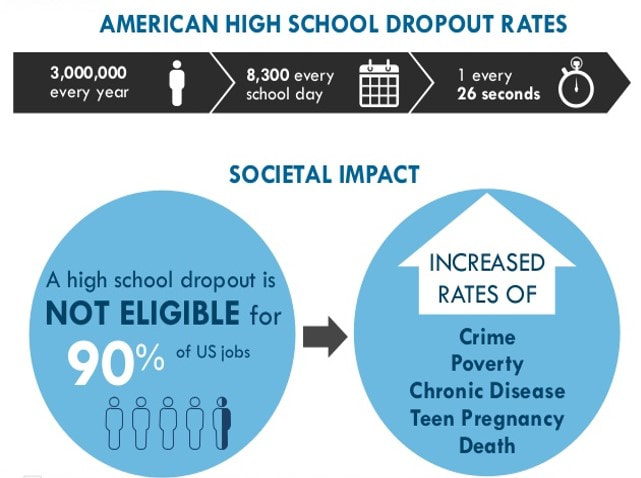WHY TEENS ACT?
Each year, approximately 1.3 million American students fail to graduate high school—this means that two students drop out every minute! More than half of these students are from minority groups. Not only does this significantly decrease the potential earning power of these students, but it creates many problems for society as a whole. Students who drop out are more likely to commit crimes, live in poverty, and have a lower quality of life.
Teens Act, though similar in some ways with other programs who work to meet the needs of under resourced youth, is unique because it focuses on students who are most at risk of dropping out, including those who have already dropped out of regular attendance, even from other support programs. Teens Act is also unique through it specialized curriculum, home support program, and community involvement. The students Teens Act typically works with are first-generation college-bound, have a GPA of 2.5 or less (often much less than that) and many are from low-income environments (qualify for free and/or reduced lunch). To ensure that students in our program have the best possible chance to succeed, we use a specialized curriculum for academic and personal development, strong peer support from college age students and other practices and methods such as motivational speakers, campus tours, and third-party partnerships with colleges, universities, community businesses and partner organizations.
Teens Act, though similar in some ways with other programs who work to meet the needs of under resourced youth, is unique because it focuses on students who are most at risk of dropping out, including those who have already dropped out of regular attendance, even from other support programs. Teens Act is also unique through it specialized curriculum, home support program, and community involvement. The students Teens Act typically works with are first-generation college-bound, have a GPA of 2.5 or less (often much less than that) and many are from low-income environments (qualify for free and/or reduced lunch). To ensure that students in our program have the best possible chance to succeed, we use a specialized curriculum for academic and personal development, strong peer support from college age students and other practices and methods such as motivational speakers, campus tours, and third-party partnerships with colleges, universities, community businesses and partner organizations.
A report from the documentary series Frontline claims that dropouts cost society an average of $300,000 per year per dropout. Utah has not been immune from this educational disaster, and that is where Teens Act comes in.
During any school year thousands of students dropout of high school in Utah. Annually in Provo, over 100 seniors do not graduate and more students than that drop out. There are many factors that contribute to this including a lack of academic skill development, limited life skill development, limited language and culture skills, and socioeconomic factors. The socioeconomic factor has a significant impact on student success. Almost 50% of students in the Provo School District come from low income families; over 70% of students at Independence High and over 40% of students at Provo High School qualify for free and or reduced priced lunch. Research indicates that 40% of eligible students, those who qualify based upon socio economic criteria fail to claim their Pell Grants. It is crucial to assist low income students to receive the educational assistance, including an understanding of appropriate and available financial resources, that they need to succeed academically.
Our program provides services to a diverse population of students. The students who qualify for our program are primarily minorities and many are native Spanish speakers. The Center for Education Statistics' Beginning Postsecondary Study (BPS:96/01) indicates that low-income, first-generation students experience less success than their peers right from the start. In fact, low-income, first-generation students were nearly four times more likely to leave an institution of higher education after the first year than students who had neither of these risk factors. Working with students to overcome these barriers is essential for making change possible for both our students and our communities.
Our goal is to increase our reach throughout the state and into other states in the country. The work of Teens Act could benefit students nationwide.
Our goal is to increase our reach throughout the state and into other states in the country. The work of Teens Act could benefit students nationwide.


